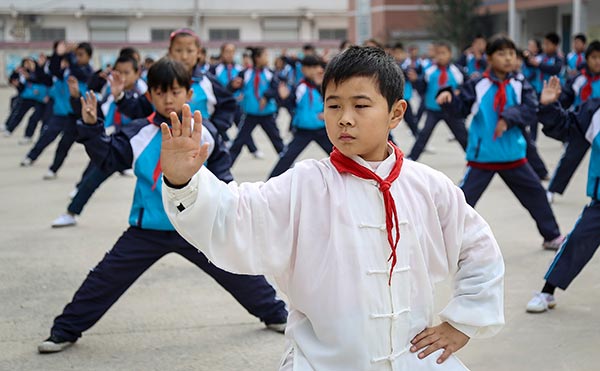


An elementary school student practices tai chi during a break in 2015 in Wenxian county, Henan province, where tai chi classes have been offered since 2001. XU HONGXING/CHINA DAILY
For residents of Chenjiagou village, the birthplace of tai chi, a more than 10-year wait to see the martial art recognized globally as intangible Chinese heritage could soon be over.
China has nominated tai chi for inclusion in the UNESCO List of Intangible Cultural Heritage, with a final decision to come late this year.
The application, made by Wenxian county in Henan province, has been in the making since 2006, when the country drew up its first national intangible heritage list and included tai chi, said Zheng Aizhen, chairman of the Wenxian committee of the Chinese People's Political Consultative Conference, the country's top policy advisory body.
"For the past decade, we have collected materials, gathered a lot of masters and experts together to discuss tai chi culture and tried to restore the centuries-old history of tai chi," Zheng said. "As a precious traditional Chinese legacy, we all have a responsibility to protect it."
China attempted to get UNESCO status for the martial art in 2008, but the application-one of 35 from China that year-was withdrawn after an evaluation deemed it "too vague", according to a Wall Street Journal report.
The next year, the rules were changed to limit nations to only two nominations, which for China were Peking Opera and acupuncture. Both went onto make the list.
The latest attempt to include tai chi comes amid speculation that South Korea and Japan could make similar nominations.
Zhang Liyong, a deputy to the National People's Congress, the country's top legislature, and president of the Henan High People's Court, said that the situation is urgent: "Both South Korea and Japan were trying to get tai chi registered. South Korea has already registered the Dragon Boat Festival as theirs, so we should be alarmed."
He was referring to the decision by UNESCO to grant intangible heritage status to the Gangneung Danoje Festival in 2008, which caused anger among some Chinese, who argued that the event is derived from the Dragon Boat Festival and accused the United Nations of endorsing South Korea's appropriation of Chinese culture. UNESCO added the Chinese festival to the list in 2009.
Chen Xiaowang, a tai chi master, said claims that tai chi was invented in Korea are based on a fictional character from a kung fu novel by Hong Kong writer Louis Cha. He said the martial art's history can be traced to creator Chen Wangting in the mid-17th century.
"If we fail again in our application, or if it is registered by South Korea, it will be a great pity," Chen said.
Zhu Xianghua, 40, the son of tai chi master Zhu Tiancai, said he feels a growing duty to protect tai chi culture. "It is not just a traditional activity; it is deeply rooted in many areas of Chinese culture, such as medicine, aesthetics and mechanics," Zhu said.
 Fire brigade in Shanghai holds group wedding
Fire brigade in Shanghai holds group wedding Tourists enjoy ice sculptures in Datan Town, north China
Tourists enjoy ice sculptures in Datan Town, north China Sunset scenery of Dayan Pagoda in Xi'an
Sunset scenery of Dayan Pagoda in Xi'an Tourists have fun at scenic spot in Nanlong Town, NW China
Tourists have fun at scenic spot in Nanlong Town, NW China Harbin attracts tourists by making best use of ice in winter
Harbin attracts tourists by making best use of ice in winter In pics: FIS Alpine Ski Women's World Cup Slalom
In pics: FIS Alpine Ski Women's World Cup Slalom Black-necked cranes rest at reservoir in Lhunzhub County, Lhasa
Black-necked cranes rest at reservoir in Lhunzhub County, Lhasa China's FAST telescope will be available to foreign scientists in April
China's FAST telescope will be available to foreign scientists in April "She power" plays indispensable role in poverty alleviation
"She power" plays indispensable role in poverty alleviation Top 10 world news events of People's Daily in 2020
Top 10 world news events of People's Daily in 2020 Top 10 China news events of People's Daily in 2020
Top 10 China news events of People's Daily in 2020 Top 10 media buzzwords of 2020
Top 10 media buzzwords of 2020 Year-ender:10 major tourism stories of 2020
Year-ender:10 major tourism stories of 2020 No interference in Venezuelan issues
No interference in Venezuelan issues
 Biz prepares for trade spat
Biz prepares for trade spat
 Broadcasting Continent
Broadcasting Continent Australia wins Chinese CEOs as US loses
Australia wins Chinese CEOs as US loses